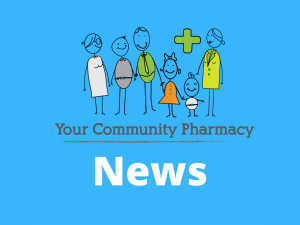
Soaring cost of a common blood clot medicine is the latest drug that is financially crippling local pharmacies
The body that represents community pharmacists in Northern Ireland has again called on the Department of Health to sort out the community pharmacy funding arrangements in Northern Ireland which are causing community pharmacies to lose thousands of pounds each month by dispensing many essential medicines at a loss.
In recent weeks, pharmacy owners have been faced with new soaring costs for several medicines, the latest being the commonly prescribed drug, Apixaban which is used to prevent blood clots.
Recent costs rises mean that pharmacies are paying as much as £36 per pack of Apixaban, however the Department of Health is currently paying a pharmacy back around £2.21 – £2.48 per pack, resulting in a significant gap in a pharmacy’s finances.
The Department temporarily increased the payment for these drugs to £14.99 on the last day of August before reintroducing the lower prices on 1st September again.
There are typically around 150 lines of medicines affected in this way every month and Community Pharmacy NI (CPNI) say this is both grossly unfair and unsustainable.
Community Pharmacy NI has been raising issues with the drug payment arrangements for years and says it is time for a fair contract for pharmacy owners. It recently met the new Health Minister to outline this again.
It points to the closure of 15 community pharmacies in the past 20 months as proof that these businesses are becoming unsustainable under current funding arrangements, with another two pharmacies closing permanently here at the end of August.
Chief Executive of Community Pharmacy NI, Gerard Greene said:
“We have been fighting for the basic prices of medicines to be met for far too long, it is a simple principle of fairness. It cannot be the case that community pharmacy owners are expected to subsidise Northern Ireland’s medicine bill from their own pockets. We know for a fact that some community pharmacy owners have had to borrow money from family members to meet medicine wholesaler bills and earlier this year the representative body for UK medicines wholesalers issued a warning that community pharmacies were struggling to pay their wholesaler bills. For a first world health service this is the sorry state of affairs.
“Community Pharmacy has two key asks. Firstly, an urgent injection of funding to help community pharmacies pay their medicine bills, and secondly, a longer-term solution in the form of a Northern Ireland specific drug tariff that meets the needs of a modern community pharmacy network, allowing it to take on a greater role in community-based healthcare.
“What we continuously hear is that there is no money, yet if primary care and community pharmacy was stabilised, community pharmacy can provide solutions to many of the issues facing our health service. Community pharmacies provide local, accessible healthcare services in every town and village across Northern Ireland. We can help prevent people from being admitted to hospital. We can help address the bottleneck in General Practice. Community pharmacy is a solution that is ready to be utilised if the will and the resource is there to do it.”





